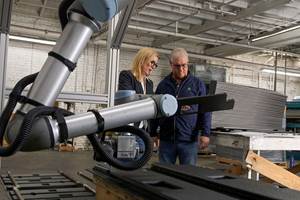Industrial Thermoformer Expands With Aid from State Training Grant
The last dollars of a $105,000 worker-training grant have now been spent.
The last dollars of a $105,000 worker-training grant have now been spent. However, the impact of those training dollars—which were awarded in late 1999 by the State of Massachusetts to custom thermoformer Universal Plastics—continues to ripple across the shop floor of this 36-year-old, family-owned business in Chicopee, Mass. The grant (whose value was doubled by the required matching funds from the recipient) was one of several awarded to Massachusetts plastics businesses under a 1998 state law that established a Workforce Training Fund.
Those training dollars continue to work through institutionalized factory meetings, a menu of courses employees can take outside of work hours, and—most important—in the enhanced skills practiced day to day on the shop floor. “The training grant was a catalyst at Universal,” recalls Joseph Peters, the company president. “It led us to re-examine basic factory practices and build improvement into the fabric of our culture.”
Universal, which was founded by Joseph Peters’ father, James Peters Sr., had always practiced informal worker training. Since the state grant went into effect, however, the company has seen a marked improvement among its workers. “When training is formalized it is generally taken more seriously,” remarks Joseph Peters.
Strategic shift called for new skills
The company generates around $10 million in annual revenue with 15 pressure-forming machines—13 of which are heavy-gauge systems used to form bathtubs, kayaks, and the like. Universal thrives on projects that require its specialized input on product and tool design, adhesive bonding, sonic welding, and printing.
Two years ago, Peters and three brothers who help manage the company faced a dilemma. The business, then with 72 employees, was poised to expand significantly, especially in value-added services for top OEMs in the region. Those clients include Pratt & Whitney, for which Universal makes aerospace ducts, Smith & Wesson (cartridge boxes), United Parcel Service (holsters for electronic clipboards), and American Biophysics (housings for a mosquito zapper).
That shift in emphasis required a plentiful pool of skilled workers, which was simply unavailable at the time. Unemployment in New England was low, and available workers in Chicopee were often new arrivals from Poland or Latin America, many of whom spoke little English. Most daunting was a dearth of the specialized skills needed for Universal’s brand of custom forming.
“This is a high-value, low-volume business in which customers lean heavily on us to provide expertise and resources that allow speedy delivery of tools and parts so they can get to market fast,” says Peters. Universal can supply parts from blueprints in five to seven weeks. If tools are CNC machined on-site, that time can be cut to three weeks.
Within a year, booming orders boosted Universal’s payroll to 120. New employees had to be brought quickly up to speed in basic English and factory practices.
Existing employees were encouraged to improve computer skills and develop new ones in five-axis CNC machining, CNC trimming, and CAD tool and product design.
Company-wide emphasis was put on safety training. Gail Kitchen was appointed the plant’s first safety and training officer. She helped form the Employee Involvement Committee to engage employees and boost morale. It publishes a monthly newsletter and meets regularly with managers to iron out shop-floor problems.
The lynchpin of the program, Peters says, was the adoption of “lean manufacturing” concepts. Aided by consultant Frank Brown, Universal examined every one of its practices for ways to improve productivity. Each department head, helped by teams of production, sales, and technical personnel, developed Key Performance Indicators. “These have taken guesswork out of factory procedures,” Peters says. The process led to numerous incremental changes that cut costs, improved efficiency, and increased safety.
Peters was recently chosen to be next year’s chairman of the Thermoforming Div. of the Society of Plastics Engineers. He hopes to help spark increased interest in workplace training in thermoforming operations across North America.
Related Content
Cobot Creates 'Cell Manufacturing Dream' for Thermoformer
Kal Plastics deploys Universal Robot trimming cobot for a fraction of the cost and lead time of a CNC machine, cuts trimming time nearly in half and reduces late shipments to under 1% — all while improving employee safety and growth opportunities.
Read MoreOMV Technologies Gets New CEO
Kooper brings 33 years of experience in the industrial and consumer packaging industries to OMV--the closed-loop, turnkey, inline extrusion, thermoforming and tooling systems manufacturer.
Read MoreA Processor's Perspective: What's Driving Growth in Heavy-Gauge Thermoforming
Key factors for the progress are innovative materials, advanced automation and precision engineering.
Read MoreThermoformed Container Keeps Battery Cells Safe
Despite last-minute design changes and other unexpected roadblocks, thermoformer TriEnda works with a key supplier on innovative reusable shipping container.
Read MoreRead Next
Making the Circular Economy a Reality
Driven by brand owner demands and new worldwide legislation, the entire supply chain is working toward the shift to circularity, with some evidence the circular economy has already begun.
Read MorePeople 4.0 – How to Get Buy-In from Your Staff for Industry 4.0 Systems
Implementing a production monitoring system as the foundation of a ‘smart factory’ is about integrating people with new technology as much as it is about integrating machines and computers. Here are tips from a company that has gone through the process.
Read More












